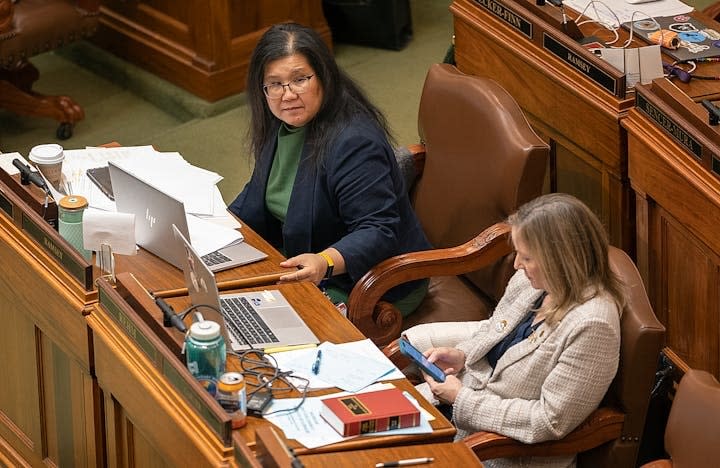Minnesota House to debate putting equal rights, abortion protections on the ballot in 2026

An expansive version of the Equal Rights Amendment could ask Minnesota voters in 2026 if they want to enshrine protections for race, sex and gender identity, and abortion in the state's Constitution.
The DFL-led Minnesota House had planned to vote on their version of the amendment late Monday or early Tuesday morning, which could set off an expensive statewide campaign similar to abortion-related referendum battles in other states since the U.S. Supreme Court's reversal of Roe v. Wade.
"We saw what the Supreme Court did, we saw a case that was as good as law to us was overturned and rights across the country were taken away from many, many individuals," Rep. Kaohly Vang Her, DFL-St. Paul, the sponsor of the measure, said before the debate Monday.
Debate in the House on other bills stretched into the evening on Monday as the Legislature races toward a May 20 deadline to adjourn. The amendment has faced fierce opposition from religious and anti-abortion groups that accused Democrats of shrouding the amendment's intent while leaving out protections based on religious beliefs.
Republicans pushed off the debate on the ERA by spending hours debating other legislation, and they were expected to offer more than a dozen changes to the proposed constitutional amendment. Legislators from both parties drafted amendments to add religion as a protected class in the bill during Monday's floor debate.
"Enabling discrimination based on religion is wrong," Jason Adkins, executive director of the Minnesota Catholic Conference, said at a new conference last week. "It's very troubling that legislators are considering depriving Minnesotans of an important legal remedy to combat the anti-religious bias."
Supporters of the bill said adding religion isn't necessary because the state Constitution already protects people based on their religious beliefs.
Democrats in the House don't have agreement yet with the DFL-led Senate, which passed its own version of the Equal Rights Amendment last session that protects people no matter their "race, color, creed, sex, sexual orientation, gender identity or expression, age, disability, ancestry, or national origin."
The House didn't take it up last year, arguing that the language needed to more explicitly ensure legal protections for abortion and gender-affirming care.
The House version up for debate includes protections for those making decisions "about all matters relating to one's own pregnancy or decision whether to become or remain pregnant." Supporters of the House language said their version will hold up better to legal challenges than the Senate's bill.
"We're rooted in the same values with the same goals, and that's what we have to iron out," said Senate Majority Leader Erin Murphy, DFL-St. Paul. The two chambers also disagree on when the amendment should be on the ballot. Senate Democrats want to put their question to voters this fall.
Abortion opponents have been critical of the language in the House bill, arguing it's trying to deceive Minnesotans into voting to protect pregnancy rights rather than using the term abortion.
"We all oppose discrimination against someone based on the fact of their pregnancy," said Cathy Blaeser, co-executive director of Minnesota Citizens Concerned for Life, the state's largest anti-abortion group. "But the actual language, which would go into our Constitution, would provide a fundamental right to make decisions about becoming and remaining pregnant, with no protection for babies."
If the ERA passes the Legislature, both sides anticipate a massive statewide campaign in order to educate voters on the amendment. With millions of dollars likely to be spent, Democrats said there won't be any confusion about the fact that voters are also protecting abortion rights if they vote yes on the Equal Rights Amendment.
"There are many reasons why we want to make sure people are really aware of what they are voting for," said Her, the bill's sponsor. "We want it all to be public, all to be open, people to be really informed when they vote on this."
Since the Supreme Court's 2022 decision, voters in six states have weighed in on constitutional amendments regarding abortion, with abortion rights groups prevailing in every state. This fall, more than a dozen states may have abortion-related measures on the ballot.
Time is running short in the 2024 legislative session and there's pressure on Democrats to pass something while they have full control of the House and the Senate. All House seats are on the ballot this fall, meaning control of the chamber is at stake. Constitutional amendments need approval from both chambers — but not the governor — to get on the ballot.
